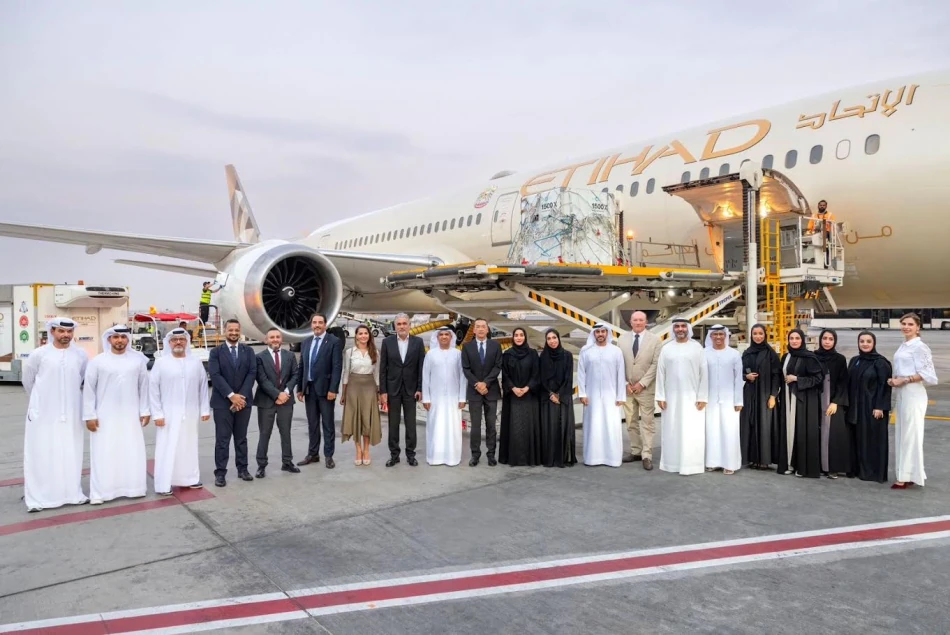
Abu Dhabi's Regional Vaccine Distribution Center Commences Operations
Abu Dhabi Emerges as Middle East Vaccine Hub with GSK's Fourth Global Distribution Center
Abu Dhabi has officially launched the Middle East's first GSK vaccine distribution center, marking a strategic pivot toward becoming a global life sciences powerhouse. The facility, now operational in KEZAD with its first shipments arriving, positions the emirate as the fourth location worldwide for the pharmaceutical giant's regional distribution network, alongside established hubs in developed markets.
Strategic Infrastructure Play in Post-Pandemic Era
The timing reflects lessons learned from COVID-19 supply chain disruptions. Abu Dhabi's Department of Health has partnered with GSK, Abu Dhabi Investment Office, and logistics leader Etihad Cargo to create what officials describe as a "proactive healthcare model" that could reshape regional vaccine access.
Located in KEZAD and operated by Rafed, a PureHealth subsidiary, the center leverages Abu Dhabi's geographic position between Europe, Asia, and Africa. This echoes Singapore's successful strategy of becoming Asia's pharmaceutical logistics gateway, though Abu Dhabi targets the underserved Middle East and North Africa markets.
Scale and Operational Capacity
The facility will manage over 20 vaccines covering pediatric and adult populations, with plans to distribute millions of doses annually. Advanced cold-chain systems ensure temperature-controlled storage and real-time tracking throughout the supply chain—critical capabilities that proved lacking during the pandemic's early phases.
The center connects to Etihad Cargo's "Pharma Life" network, covering more than 100 global destinations with specialized pharmaceutical shipping services. This infrastructure advantage positions Abu Dhabi to compete with established regional hubs like Dubai's pharmaceutical free zones.
HELM Initiative: Building a Life Sciences Ecosystem
The vaccine center represents the first major operational milestone for HELM, Abu Dhabi's life sciences cluster launched in April 2025. The initiative aims to attract investment across precision medicine, pharmaceutical manufacturing, and biologics logistics—sectors where the UAE previously lagged behind Israel and Turkey in the region.
Dr. Noura Khamis Al Ghaithi, Undersecretary of Abu Dhabi Department of Health, positioned the launch as creating "a comprehensive proactive health model" that enhances regional emergency response capabilities. This language suggests Abu Dhabi is preparing for future health crises while building commercial advantages.
Market Implications for Regional Healthcare
For pharmaceutical companies, Abu Dhabi's emergence reduces dependency on European distribution centers for Middle Eastern markets. GSK's Boyd Chongphaisal emphasized the partnership's focus on "timely and effective delivery to target communities," addressing a key weakness in regional vaccine rollouts during recent health emergencies.
The move also signals Abu Dhabi's broader economic diversification strategy, moving beyond oil revenues toward high-value healthcare and biotechnology sectors. This mirrors successful transformations in Ireland and Singapore, though Abu Dhabi benefits from substantial sovereign wealth fund backing.
Competitive Positioning and Future Expansion
The facility's flexible design allows expansion for new vaccine technologies and increased demand—crucial as mRNA and other advanced platforms require specialized handling. This forward-thinking approach contrasts with traditional distribution models that struggled to adapt during COVID-19 vaccine rollouts.
Mohamed Mostafa Said, Rafed's CEO, highlighted the center's role in "cross-border collaboration" and building healthcare system resilience. The emphasis on regional cooperation suggests Abu Dhabi aims to become the logistics backbone for vaccine programs across emerging markets in Africa and South Asia.
Investment and Policy Implications
The successful launch validates Abu Dhabi's regulatory environment and infrastructure investments, potentially attracting additional pharmaceutical companies seeking regional distribution hubs. The partnership model—combining government backing, private sector expertise, and international pharmaceutical partnerships—offers a template for other Gulf states.
For healthcare investors, the development signals growing confidence in Middle Eastern pharmaceutical logistics markets. The center's integration with global supply chains also reduces investment risks associated with regional political instability or trade disruptions.
As vaccine distribution becomes increasingly critical for pandemic preparedness and routine immunization programs, Abu Dhabi's positioning as a regional hub could generate significant economic returns while advancing public health objectives across underserved markets spanning three continents.
Most Viewed News

 Sara Khaled
Sara Khaled






